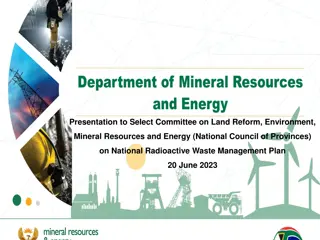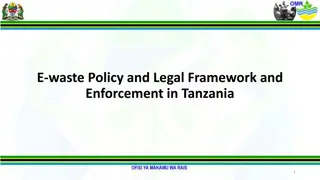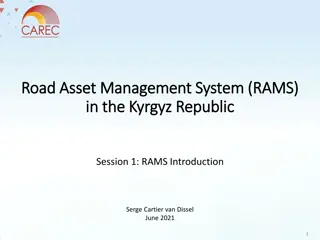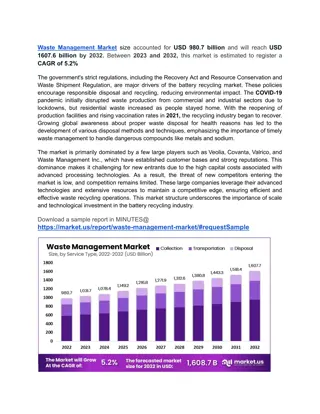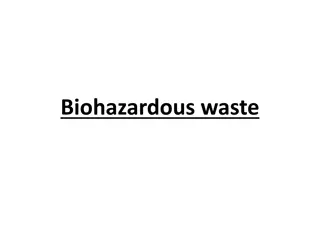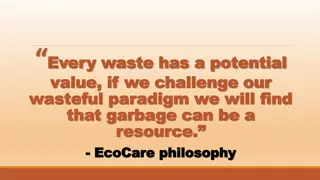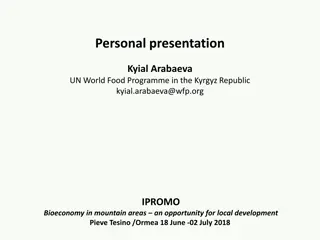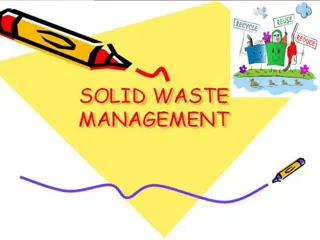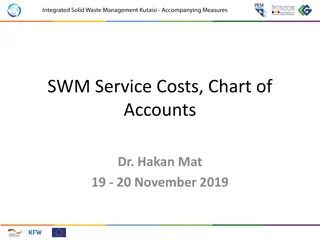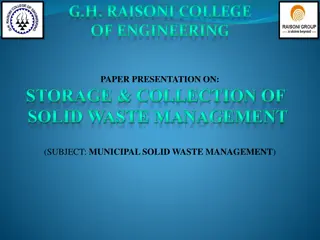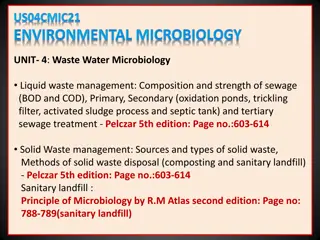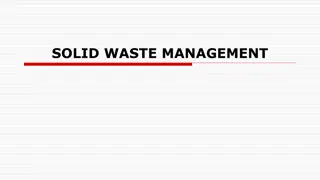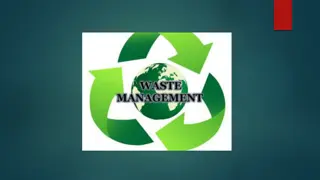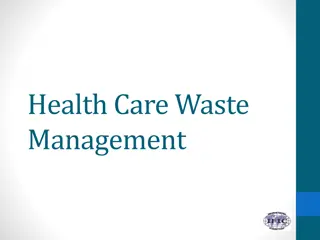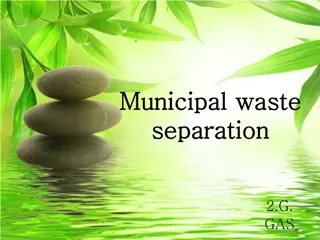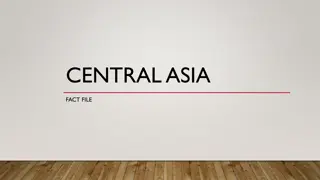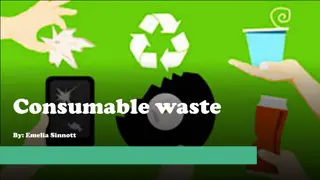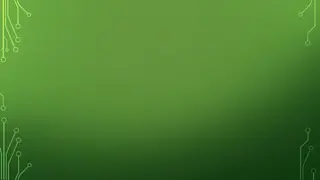Waste Management Education in Kyrgyz Republic: Impact and Recommendations
This seminar delves into waste management education in the Kyrgyz Republic, focusing on the current challenges, past studies, methodologies, and results to propose recommendations for addressing environmental impacts. Issues such as lack of recycling, low ecological awareness, and ineffective educational programs are discussed, highlighting the need for improvement in waste handling practices and environmental literacy.
Download Presentation

Please find below an Image/Link to download the presentation.
The content on the website is provided AS IS for your information and personal use only. It may not be sold, licensed, or shared on other websites without obtaining consent from the author.If you encounter any issues during the download, it is possible that the publisher has removed the file from their server.
You are allowed to download the files provided on this website for personal or commercial use, subject to the condition that they are used lawfully. All files are the property of their respective owners.
The content on the website is provided AS IS for your information and personal use only. It may not be sold, licensed, or shared on other websites without obtaining consent from the author.
E N D
Presentation Transcript
JDS International Seminar Part 2: Waste Management Education and its Impact on the Environment of the KyrgyzRepublic Authors: Ruslan Tashiev1 and KenichiMatsui2 1Graduate School of Life and Environmental Sciences, University of Tsukuba,Japan 2Faculty of Life and Environmental Sciences, University of Tsukuba,Japan January 21-22, 2019
OUTLINE 1. Introduction and StudyArea 2. Past Studies 3. Objectives 4. Methodology 5. Results 6. Conclusions 7. Recommendation 8. References
1.1 The current situation in waste management Bishkek city http://reporter.akipress.org/news:22654 http://reporter.akipress.org/news:73337 3
1.2 Introduction Problems of waste management A large area in a landfill (1970.) There is no sorting, collection, recycling, disposal of solid waste. Low level of ecological culture among the population. The programs of television environmental topic are ineffective and boring, they are conducted formally, there is no purposeful activity in raising environmental awareness. and radio companies on the Education system: 4-5-2-5. Literacy rate: Adult (15+) 99.8% in 2009 https://www.baibol.kg/ru/tourism-in-kyrgyzstan/
1.3 Getting rid of trash in Bishkek city 7 2015 100% 0.8 95.3 3.4 - - 2016 100% 0.6 96.6 2.8 - - 201 100% 0.3 96.9 2.7 - - Bishkek Garbage chute Collecting by truck Dump in garbage heaps Burning Burying Bishkek 1.5 million cubic meters of solid waste (1 year) 1 person 211 kg (1 year) http://www.stat.kg/media/publicationarchive/
2.1 Past Studies on Environmental Awareness in School Education is crucial for achieving sustainable development and environmental literacy (UNESCO, 1992). Environmental awareness at school increases with the recognition of environmental issues (Charter, 1992). Good environmental education, like any good education, must lead pupils and students out and on from their immediate perceptions and experience to a wider understanding. (Strong, 1998). Students 16-17 year old students and teachers tend to have superficial and low sensitivity toward environmental issues (Lim, 2005).
2.2 Past Studies on EnvironmentalAwareness in the Kyrgyz Republic A number of common tasks should be solved to ensure an appropriate level of teaching environmental disciplines in higher education institutions (Kasymova, 2001). Schools use outdated and non-effective curriculum for students; teachers training methods are outdate (Abzhamilov, 2001). Some studies focus on activities to promote environmental awareness in educational institutions and the general public. Most studies focus on students older than 10 years old. Few studies assess the level of awareness among pupils and students.
3. Objectives To examine the level of awareness, knowledge and practice of students in municipal and private schools in Bishkek. To assess the effectiveness of current waste management education in municipal and private schools in the Kyrgyz Republic. To contribute to improving waste management education in municipal and private schools in the KyrgyzRepublic.
uestionnaire Survey ple size schools (10 teachers from each school*) district. vey (4 parts) 4. Methodology -Q Sampling and sam 4 public & 4 private Location: Bishkek, 4 Questionnaire sur 5-point Likert scale 1. Socio-demographic 2. School environment 3. Waste issues 4. Awareness Questionnaire surv https://www.sogosurvey.com/blog/more-conversation-than-questionnaire/ characteristics ey (October, 2018)
5.1 Results: Socio-demographic characteristics Characteristics Gender Male Female Age < 30 31 40 41 50 51 60 Above 60 Education Special Secondary University Work Experience/ years < 3 3 4 5 6 7 8 9 10 >10 Category of Teachers Private School Municipal School Percentage Frequency 25% 75% 20 60 18.8% 21.3% 37.5% 18.8% 3.7% 15 17 30 15 3 5% 95% 4 76 11.3% 8.8% 20% 13.8% 7.5% 38.8% 9 7 16 11 6 31 51.2% 48.8% 41 39
5.2 Students level ofknowledge How would you agree with the following statement: Q: Students know enough about waste management?
5.3 Frequency of teaching about waste management Q: How often do you teach students on waste management issues? 90% 80% 80% 70% 60% 50% 40% 30% 20% 15% 10% 5% 0% Once aweek Once in 2weeks Once amonth Source: field survey
5.4 Adequacy of the currentcurriculum Q: Current curriculum is adequate to provide knowledge about waste management to students. Source: field survey
5.5 Effectiveness of current teaching methods Q: Teaching about waste management at school should be improved? Source: field survey
5.6 School cleaning activities Q: Who does waste collection and sorting activities currently in yourschool? Source: field survey
5.7 Waste collection and sorting in thefuture Q: How would you like waste collection and sorting activities to be done in the future? Source: field survey
6.1 Conclusion Only 29% of the teachers perceived students level of awareness and knowledge about waste management to be adequate. Both students and teachers less 15% rarely participated in waste collection and sorting activities in their perspective schools. Nearly half (46%) of the teachers perceived the current curriculum to be adequate for waste management. However (94%) acknowledge that the curriculum needs to be further improved.
6.2 Recommendation The government and school authorities organize activities to increase their awareness such as workshops, study trip to landfills, student waste management organizations.
7. References Abzhamilov, T., (2001). Some Ways To Solve The Problem Of Ecological Education And Education At School. In Soros Kyrgyzstan Foundation, Environmental Education for Sustainable Development of Kyrgyzstan:Materialsof the RepublicanScientificand PracticalConference(60-62) Baibol (2018, December 21). Where is locatedKyrgyzstan.Retrieved fromhttps://www.baibol.kg/tourism-in-kyrgyzstan Charter,M. (Ed.). (1992). Green marketing:A responsible approachto business.Sheffield,UK: GreenleafPublishing.doi:10.9774/GLEAF.978-1-907643-57-6_7 Kasymova, V.M. (2001). On the purposes and tasks of the regional project of the global environmental fund (GEF) water resources management and environment in the pool of the Aral sea for implementation of the program of the basin of the Aral sea (ASBP) on the improvement of ecological programs in Kyrgyzstan. In Soros Kyrgyzstan Foundation, Environmental Education for Sustainable Development of Kyrgyzstan: Materials of the Republican Scientific and Practical Conference (60-62) Lim, S.F., (2005).Environmentalmanagement and environmental educationin two schools in the Klang Valley. UnpublishedMasterof EnvironmentalTechnology Dissertation, Facultyof Science, University of Malaya, KualaLumpur. Legman. (2013, July 22). In Bishkek, garbagecollectionis carriedout near the Orto-Sai market, - City Hall. Retrievedfromhttp://reporter.akipress.org/news:22654 Legman. (2018, March 19). Garbage is not cleaned at Usenbayeva-Linenaya in Bishkek. Retrieved fromhttp://reporter.akipress.org/news:73337 Manolas,I.E., (2009).EnvironmentalEducationprogramsin Greek SecondarySchools. In Neil Taylor, MichaelLittledyke,Chris Eames and RichardK. Coll (Eds.), EnvironmentalEducationin Context:An InternationalPerspectiveon the Developmentof EnvironmentalEducation(83-97). Rotterdam,The Netherlands.Sense Publishers. NationalStatisticsCommittee,Kyrgyz Republic.(2018, December 27). Literacyof population(people).Retrievedfromhttp://www.stat.kg/en/opendata/category/278/ NationalStatisticalCommittee.(2013).Gettingrid of trash.RetrievedOctober,2018, fromhttp://www.stat.kg/media/publicationarchive NSK KR. (2018, December 20). Total populationby nationality (assessmentat the beginningof the year, people). Retrievedfrom http://www.stat.kg/en/opendata/category/312/ NSK KR (2018, December 21). Residentpopulationas of the beginningof the year (thus. people). Retrievedfromhttp://www.stat.kg/en/opendata/category/39/ Strong, C. (1998). The impact of environmental education on children's knowledge and awareness of environmental concerns. Marketing Intelligence & Planning, 16(6), 349-355. Retrieved from https://search.proquest.com/docview/213129621?accountid=25225 UNESCO (1992). UN Conference on Environment and Development: Agenda 21 (Switzerland,UNESCO).
T H A N K Y O U



